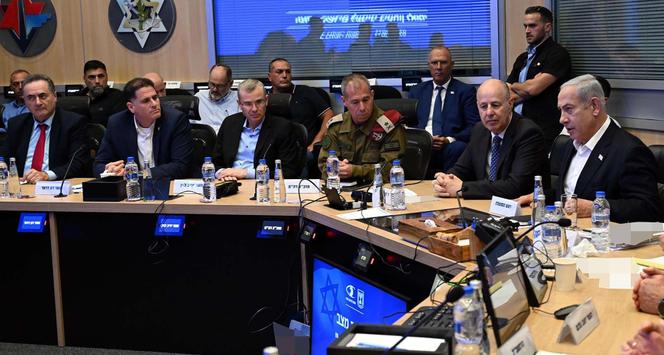Prime Minister Benjamin Netanyahu of Israel has agreed to a ceasefire, but he is facing significant pressure from both his cabinet and the public. They want a decisive end to Hamas, the group that controls Gaza. This situation is complex and tense.

Background on the Ceasefire Agreement
Israel and Hamas have a history of conflict. This often results in violence and suffering on both sides. Recently, after intense fighting, there was an agreement for a ceasefire. A ceasefire is an agreement to stop fighting and hostilities for a period. The goal is usually to create a chance for peace talks and reduce casualties.
Public Opinion and Pressure
Many Israelis are unhappy with the ceasefire. They believe it is only a temporary solution. They fear that Hamas will rebuild its strength and attack again. These citizens want a more permanent solution. They want the Israeli government to take strong action to prevent future attacks.
Cabinet Discontent
Netanyahu’s cabinet also has strong opinions. Some members believe that the ceasefire is a mistake. They argue that Hamas is a terrorist organization and must be defeated completely. They think that a decisive military action is necessary to ensure the safety of Israeli citizens. These cabinet members are pushing Netanyahu to take a harder stance against Hamas.
Security Concerns
Hamas has launched many rockets into Israel, causing damage and fear. This makes many Israelis feel insecure. They believe that as long as Hamas exists, they are not safe. This fear adds to the pressure on Netanyahu to take strong action. People want to live without the constant threat of attacks.
Political Challenges
Netanyahu is also facing political challenges. He has to balance different opinions within his government. Some allies support the ceasefire, while others demand a stronger response. This division makes it difficult for Netanyahu to make decisions. He has to consider the long-term political consequences of his actions.
International Pressure
Internationally, there is also pressure for peace. Many countries and organizations are calling for a lasting solution to the conflict. They support the ceasefire and urge both sides to engage in peace talks. However, these international calls for peace can conflict with the internal demand for strong action against Hamas.
Humanitarian Concerns
The conflict causes significant humanitarian issues. Many people in Gaza suffer from the violence. There are also casualties and damage in Israel. A prolonged conflict can worsen these humanitarian problems. Ceasefires can provide temporary relief and a chance to address these issues. However, the desire for decisive action can sometimes overshadow these humanitarian concerns.
Economic Impact
The conflict also affects the economy. Constant fighting disrupts daily life and business activities. Both Israelis and Palestinians suffer economically. A stable and lasting peace is essential for economic recovery and growth. However, achieving this peace is challenging amid calls for decisive military action.
Netanyahu’s Leadership
Netanyahu’s leadership is under scrutiny. His decisions during this time will impact his political future. He has to show that he can protect Israeli citizens while also seeking a peaceful solution. This is a difficult balance to achieve. His response to the pressure from his cabinet and the public will be closely watched.
Possible Outcomes
There are several possible outcomes to this situation. Netanyahu might decide to launch a major military operation against Hamas. This could lead to significant short-term results but might also escalate the conflict further. Alternatively, he might continue to push for peace talks, hoping for a long-term solution. Each choice has risks and benefits.
The Role of Other Countries
Other countries play a role in this conflict as well. Nations like the United States have influence and can impact decisions. They can provide support or put pressure on Israel and Hamas to reach an agreement. Their involvement is crucial in finding a solution to the conflict.
The Future of Gaza
The future of Gaza is also a key concern. The people living there face harsh conditions. Any solution must consider their well-being. A military solution alone may not address the underlying issues in Gaza. Economic and social development is needed for a lasting peace.
Conclusion
Prime Minister Netanyahu is in a challenging position. Despite agreeing to a ceasefire, he faces immense pressure from his cabinet and the public to take decisive action against Hamas. Balancing security, political, and humanitarian concerns is not easy. The future of the region depends on finding a solution that ensures safety and stability for both Israelis and Palestinians. Whether through military action or peace talks, Netanyahu’s decisions will have a profound impact on the future.
4o



Leave a Reply